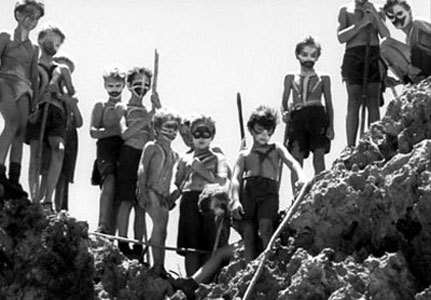You have no items in your cart. Want to get some nice things?
Go shopping
Gangs. It’s a great theme. Hasn’t everyone been in a gang at some point? We obsess about gangs as kids—starting them, desperate to be included in them, mortified at being barred from them. Mine was called The Bourne Lane Bunch. We met in secret in the hen shed. My code name was Curly; Karl Wilkinson from next door was my deputy and went by the handle Razor, and our secret symbol was an octopus. It just made sense at the time.
Many gangs in literature seem to involve kids too. Children’s fiction itself is full of the kind of gangs you’d love to be part of: the criminal-thwarting gangs of Enid Blyton’s Famous Five and Secret Seven; Peter Pan’s Lost Boys; the gangs of the comic world like the Bash Street Kids or Dennis’s Menaces versus Walter and his Softies; the Outlaws, the gang of four scruffy boys led by William Brown in Richmal Crompton’s brilliant Just William stories, and many more. When we’re kids, gangs are full of the allure and excitement of belonging, and the safety and power of numbers.
Then, we grow up, and being in a gang takes on a whole new meaning. They become dangerous; it’s all about exclusion, the mob mentality, power politics, and crime. In grown-up fiction, gangs are much scarier beasts, and the tendency of children to form gangs becomes a means of examining the darker depths of human nature—think the grim, inevitable bullying and deadly exclusion from the group in William Golding’s Lord of the Flies.
I went back to re-read one of the best gang stories ever written, Graham Greene’s “The Destructors”, a short story first published in 1954. In the empty lots of a Blitz-battered London, the Wormsley Common Gang gets up to the usual harmless petty crime, until the arrival of a new boy on the scene. The newcomer takes control and suggests the idea of destroying an old man’s house, one that has survived the bombing, smashing it up from the inside, razing it to the ground, for seemingly no other reason than the triumph of destruction.
The story is about gang politics—how power is gained, held and lost, but it also deals with the potential of the gang to break social boundaries, to make its members do things they never would do alone. Gangs have their own hierarchies, codes of behaviour, and leaders. They are societies in themselves, putting those in them outside the civil rules that apply to the rest of us. The Wormsley Common Gang destroy a house designed by Wren, a beautiful house that has miraculously survived the deliberate flattening and destruction of the Blitz—why? Because their leader tells them to; because all the other boys are doing it; because they can.
Blackie, the deposed leader of the gang, asks Trevor, the disturbingly emotionless instigator of the destruction, if he hates the owner of the house. “I don’t hate him. There’d be no fun if I hated him,” is the chilling answer. “All this hate and love […] it’s soft, it’s hooey. There’s only things, Blackie.”
There’s a paradox here about the power of gangs; together, the boys can rip a house to pieces, smash the furniture and bring down the walls. But in the rest of the world they are powerless—they are poor with not much of a future to look forward to. If the world was only made up of things, the boys would have complete power over it, but it isn’t, so their power is futile—an illusion.
It’s a paradox that has increasing resonance today. The papers are full with reports of gang violence, hoodies, and bullying, but kids in gangs are also some of the most disenfranchised members of society. Violence and scare tactics are usually their only chance of wielding influence, but their ability to rule or to intimidate only lasts so long as they are in a gang. Outside it, they are powerless.

About Emily Cleaver
Emily Cleaver is Litro's Online Editor. She is passionate about short stories and writes, reads and reviews them. Her own stories have been published in the London Lies anthology from Arachne Press, Paraxis, .Cent, The Mechanics’ Institute Review, One Eye Grey, and Smoke magazines, performed to audiences at Liars League, Stand Up Tragedy, WritLOUD, Tales of the Decongested and Spark London and broadcasted on Resonance FM and Pagan Radio. As a former manager of one of London’s oldest second-hand bookshops, she also blogs about old and obscure books. You can read her tiny true dramas about working in a secondhand bookshop at smallplays.com and see more of her writing at emilycleaver.net.




